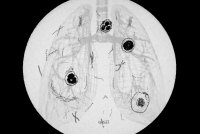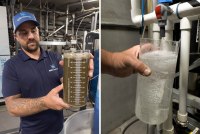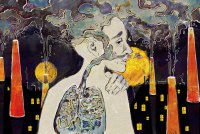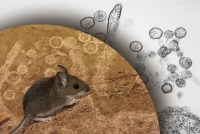Climate Activists Cite Health Hazards in Bid To Stop Trump From ‘Unleashing’ Fossil Fuels
Buoyed by a Montana court ruling upholding state residents’ right to a “clean and healthful environment,” nearly two dozen people ages 7 to 24 hope to block the Trump administration’s executive orders on energy.
Neumáticos tóxicos están matando a los peces. ¿Qué pasa con los humanos?
Durante décadas, las preocupaciones sobre la contaminación automovilística se han centrado en lo que sale del tubo de escape. Ahora, investigadores y reguladores dicen que se necesita prestar más atención a las emisiones tóxicas de los neumáticos mientras los vehículos circulan por las carreteras.
Tire Toxicity Faces Fresh Scrutiny After Salmon Die-Offs
Tires emit huge volumes of particles and chemicals as they roll along the highway, and researchers are only beginning to understand the threat. One byproduct of tire use, 6PPD-q, is in regulators’ crosshairs after it was found to be killing fish.
En Montana, investigan una nueva y poderosa vacuna contra la tuberculosis
La tuberculosis mata a 1.6 millones de personas anualmente, en especial en zonas pobres del planeta.
The Path to a Better Tuberculosis Vaccine Runs Through Montana
Researchers at the University of Montana have pitched in to develop a more effective vaccine in the fight against an ancient disease that still kills an estimated 1.6 million people a year worldwide.
Possibility of Wildlife-to-Human Crossover Heightens Concern About Chronic Wasting Disease
A response is ramping up to a potential spillover of the neurological disease to humans from deer, elk, and other animals.
Food Sovereignty Movement Sprouts as Bison Return to Indigenous Communities
Native American leaders see bison herds and ancestral gardens as ways to bring healthy eating to their people.
As Water Reuse Expands, Proponents Battle the ‘Yuck’ Factor
As drought and climate change threaten water supplies, municipalities around the country are ramping up water reuse efforts. But they have to overcome the “yuk” factor.
¿Depresión? ¿Ansiedad? La contaminación atmosférica podría ser responsable
Las investigaciones demuestran que las partículas diminutas eluden los sistemas de filtrado del organismo al aspirarse por la nariz y la boca, y que viajan directamente al cerebro.
Depressed? Anxious? Air Pollution May Be a Factor
A growing body of research is finding links between air quality and mental health, as therapists report seeing patients with symptoms linked to pollution.
Un arma secreta para prevenir la próxima pandemia: los murciélagos frugívoros
En Montana, investigarán cómo los murciélagos de la fruta, albergan virus que, bajo determinadas condiciones del medio ambiente, pueden pasar a los seres humanos.
A Secret Weapon in Preventing the Next Pandemic: Fruit Bats
New research links habitat destruction with the spillover of viruses from animals to humans.
Las medidas de Colorado no sirven para frenar los altos niveles de ozono peligrosos para la salud
El ozono se crea cuando las sustancias químicas que se emiten a la atmósfera a través de los tubos de escape de los vehículos, la explotación de petróleo y gas y los incendios forestales se calientan con el sol. La contaminación por ozono es un problema persistente en la región.
Colorado’s Efforts Are Not Enough to Solve Its Ozone Problem
Some health experts said measures underway by state and federal officials won’t lower ozone pollution to safe levels across nine counties of Colorado’s Front Range.
Don’t Nurse That Moscow Mule — It Could Be a Health Hazard
Researchers in Montana have found that unsafe levels of copper can leach into the cocktail in less than half an hour.
Cuidado con este cóctel, puede ser peligroso para la salud
El Moscow Mule se toma en una jarra de cobre, lo que lo vuelve fascinante, y tal vez peligroso.
Montana Mice May Hold the Secret to Virus Spillover
Researchers in Montana are working to figure out how climate change and biodiversity affect viruses’ jump from animals to people.
El auge de las ciudades del oeste eleva niveles de ozono nocivo
Aunque ha habido reducciones significativas, en algunas partes del país, especialmente en los valles montañosos densamente poblados del oeste, el gas inodoro e incoloro ha seguido siendo obstinadamente difícil de reducir a niveles seguros.
Western Boom Cities See Spike in Harmful Ozone
Vehicle emissions, oil and gas drilling and climate change have combined to create more days with unhealthy levels of the colorless, odorless gas from Denver to Phoenix.
La creciente invasión de entornos naturales a medida que aumenta la población mundial hace que la pregunta sea cuándo ocurrirá otra pandemia mortal, no si ocurrirá.




















